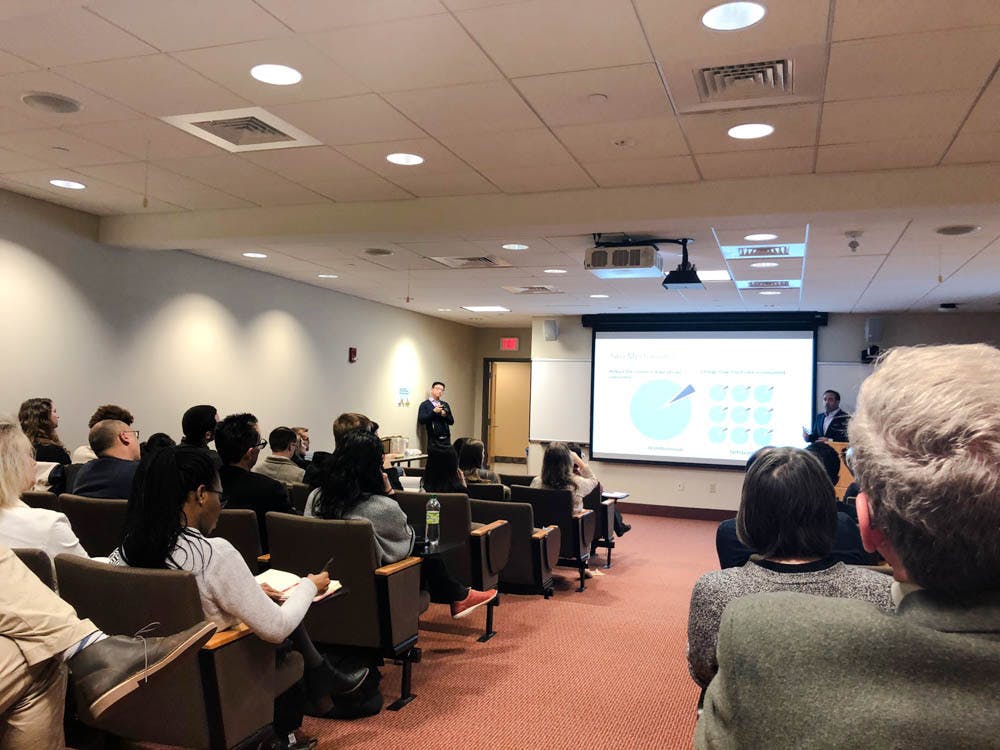Yesterday, Brown students and professors gathered to hear Christopher Robertson, a law professor at the University of Arizona, argue against the use of cost sharing in health insurance, which includes copays, coinsurance and deductibles.
The talk was part of the Brown Policy Lab’s year-long event series, according to Director David Yokum. In accordance with The Policy Lab’s mission to “apply research to help improve life” in the Rhode Island, Yokum said that the Lab chooses speakers who “imbue some of the best and latest thinking on what empirical sciences have to say” about various policy issues.
Robertson, the author of “Exposed: Why Our Health Insurance Is Incomplete and What Can Be Done about It,” discussed the idea of “moral hazard” in health insurance at the event. “Normally, in a free market, we expect people to weigh the costs and benefits of the things that they purchase,” he said. “But the problem is that under health insurance, the patient is supposedly deciding whether to consume care, whereas the insurer is paying for it.” When consumers pay for insurance, and not for the care itself, they are more likely to seek care and over-utilize resources. He said that the American health care system solves this issue by creating deductibles, copays and coinsurance. These expenses are examples of “cost sharing” since payment is divided between patients and insurers.
The problem, Robertson argued, is that patients do not know which services to pursue in a cost-sharing system. Often, they cut off health services “indiscriminately,” such as halting the use of important medications or antibiotics. This is because patients do not have the knowledge to accurately compare products, so their decisions are driven by doctors’ recommendations.
Robertson said that if health care systems continue to use the cost-sharing method, they should “start thinking about it as a nudge, where we target health care that we think has low value,” rather than utilizing this strategy on all services. This practice could push patients to choose their care more efficiently.
With current cost-sharing methods, doctors also need to consider the cost to patients when recommending which services to use, Robertson added. “Providers need to start thinking about (price) as a risk factor,” he said. “If they are choosing between your patented chemotherapy drug and your unpatented one, and one is likely to push (the patient) into bankruptcy, the health care provider, the oncologist, needs to think about that.”
Additionally, Robertson said that cost sharing should be scaled depending on ability to pay. “There’s no reason that someone who earns ten times what another person earns should have the same cost exposure,” he said.
Langa Bakhuluma-Ncube, a first-year MPH student at the University from Zimbabwe, said she came to the event because “the U.S. health care system is something I’ve never really learned about, and coming from a place that has universal health care, it would be interesting to finally understand it.”
Sandra Ferretti, a senior advisor at the School of Professional Studies, said that her background on Rhode Island’s health care exchange program sparked her interest in this event. Ferretti hoped to learn more about “the structure of health insurance and why we should be concerned about the prejudices we’ve built into our insurance system,” she said.
Yokum said that Brown Policy Lab’s talks aim to strike a balance between an overview of the issue and the data behind it. “If you’re not a health policy expert, you shouldn’t feel discouraged from coming to these (events),” Yokum said.





